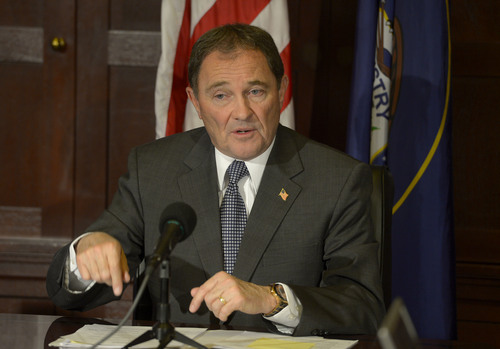This is an archived article that was published on sltrib.com in 2014, and information in the article may be outdated. It is provided only for personal research purposes and may not be reprinted.
Gov. Gary Herbert, as befits a good conservative, is not predisposed to wildly wave his veto pen around. When the dust settled from the 2014 regular session of the Utah Legislature, the governor vetoed only three bills and one appropriation line item.
All of them were good decisions.
One of the bills that Herbert vetoed was the last of a near-dozen measures aimed at cleaning up the mess left by the rise and fall of former Attorney General John Swallow. House Bill 414 was intended to make it easier for the Legislature to enforce the subpoenas it issues in matters such as the Swallow investigation. It was sponsored by Rep. Jim Dunnigan, R-Taylorsville, who ably led the special House panel that looked into and exposed the many sordid details of how the now-disgraced attorney general ran his office as a pay-to-play emporium for his high-rolling friends.
Swallow did drag his feet in complying with some House subpoenas, which unquestionably added time, money and frustration to the investigation. Dunnigan's HB414, though, could reasonably be read as serious overkill, and Herbert was right to veto it.
The problem, though Dunnigan says Herbert has misread the legislation, is that the bill does appear to give the Legislature itself sole power to decide if a committee's subpoena was just, to impose fines on those it holds in contempt of those subpoenas, and to so constrain the power of the courts to intervene that it amounted to a violation of both due process rights and the separation of powers.
If the governor and his legal staff read the bill that way, the danger that lawmakers and judges would so interpret it was too great, as was the risk that it would hand lawmakers too much power to harass or embarrass not only suspects, but also political opponents.
The governor was also correct to veto SB257, a last-minute bill that would have added the potentially dynamite job of reviewing parent protests of local school curricula to an existing committee of volunteers who were assembled only to screen the questions on state assessment tests.
It was a job that committee did not want, and a bill that state education officials and PTA leaders alike opposed. As another example of legislative meddling in the affairs of local districts and professional educators, it was well vetoed.
Also vetoed was another interference in local affairs, a bill to place a moratorium on new local assessment areas. And an apparently erroneous duplication of a $100,000 education project.
Lawmakers should leave these vetoes intact.



